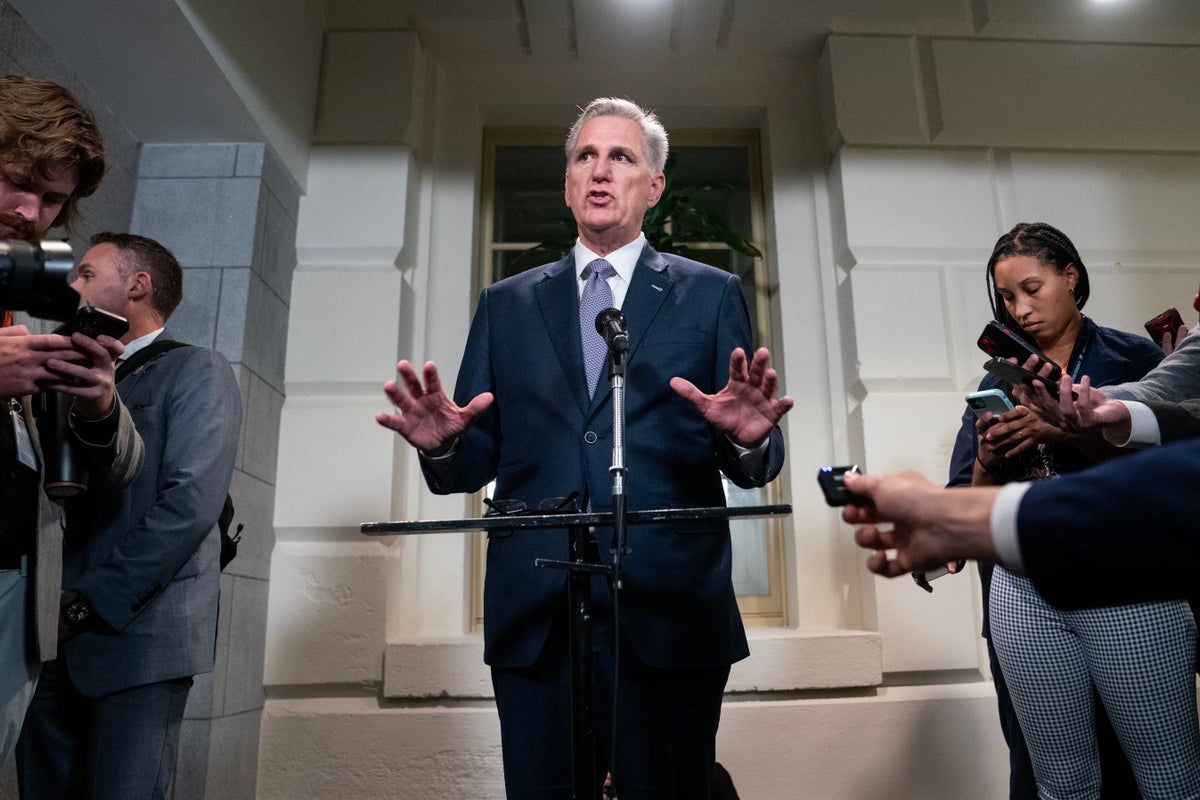Government shutdown narrowly averted as Senate backs McCarthy deal with Democrats


The Senate voted overwhelmingly to approve a stopgap bill to fund government operations for the next 45 days with three and a half hours to go until a midnight deadline at the end of fiscal year, ending a days-long standoff which had threatened to paralyse federal agencies and leave millions of workers without paychecks.
The upper chamber approved the measure, known as a continuing resolution, hours after the House of Representatives approved an identical bill put forth by House Speaker Kevin McCarthy.
It is expected that President Joe Biden will sign the legislation before 12.01 am on Sunday, averting a lapse in appropriations that would have resulted in the entire US government having to shut down non-essential operations.
Mr Biden’s signature will allow lawmakers a brief respite, during which they will have to craft appropriations bills to keep the US government operating for the entire 2024 fiscal year, as well as debate and approve supplemental a spending bill to continue funding Ukraine’s defence against Russia.
The tensions which led to funding impasse, including opposition to funding Ukraine by a small number of Republicans and a desire among a hard-right faction of the GOP to enact sweeping spending cuts and bake harsh immigration policies into must-pass budget bills, still remain and will undoubtedly cause tensions as lawmakers work on full-year spending bills.
But the last-minute deal, which keeps over a million civilian federal workers and two million uniformed service members from being furloughed or forced to work without pay, is a sign that a strong bipartisan coalition has rejected the demands of the farthest-right reaches of the House Republican Conference.
Senator Richard Blumenthal, a Connecticut Democrat, told reporters outside the Senate chamber that he and his colleagues were “all in favor of more resources for border security,” but stressed that both border security and immigration legislation needed to be written on a bipartisan basis.
He also said senators would be “redoubling our efforts to to preserve and expand the bipartisan coalition” that has formed to support continued US defence assistance to Ukraine.
“I’ve traveled with Republicans to Ukraine, and they are as passionate as I am about our national security interests there,” he said.
Colorado Senator Michael Bennet, whose last-minute objections over the lack of defence aid to Kyiv had threatened to scuttle the11th-hour compromise, told reporters that it is “really, really important” for the US to “send a signal to the world that we’re going to continue to work in a bipartisan way to get Ukraine the funds”.
He said the Ukrainian cause is personal to him because his mother had been born in Warsaw, Poland in 1938, just one year before Nazi Germany touched off the Second World War by invading.
“I know how important moments are like this for the United States to lead the rest of the world,” he said.
Another top Democratic, Senator Bernie Sanders of Vermont, told The Independent that he is looking forward to seeing Ukraine funding considered “in the very near future” and said there is “widespread support” in Congress for more assistance to Kyiv.
The beginning of the end of the crisis came about earlier in the day when 335 House members — all but 91 Republicans — voted to advance the GOP-authored spending bill, and after a brief delay when one senator — Mr Bennet — expressed reservations about the temporary spending bill’s lack of aid to Ukraine.
More follows…
xnxx,
xvideos,
porn,
porn,
xnxx,
Phim sex,
mp3 download,
sex 4K,
Straka Pga,
gay teen porn,
Hentai haven,
free Hentai,
xnxx,
xvideos,
porn,
porn,
xnxx,
Phim sex,
mp3 download,
sex 4K,
Straka Pga,
gay teen porn,
Hentai haven,
free Hentai,




